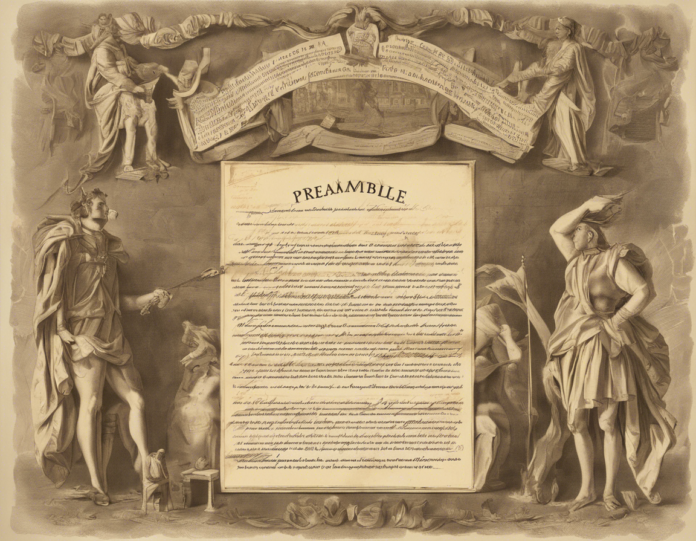In the realm of constitutional law, the preamble plays a significant role in setting the tone and providing the foundational values of a constitution. While not legally binding in the same sense as the articles and provisions that follow it, the preamble serves as an important introductory statement that outlines the purpose, principles, and objectives of the constitution. In this article, we will delve into the function of the preamble in a constitution, exploring its historical context, its significance in different legal systems around the world, and its practical implications.
Historical Background
The concept of a preamble has a long history that can be traced back to ancient civilizations such as Roman and Greek societies. These early civilizations often used preambles in legal texts to provide a foundation for the laws that followed, setting out the philosophical underpinnings and goals of the legal framework.
In modern times, preambles continue to serve a similar purpose in the drafting of constitutions. The United States was one of the first countries to adopt a preamble in its constitution, with the famous opening words “We the People…” setting the stage for the rest of the document. Since then, preambles have become a common feature of constitutions around the world, reflecting the aspirations and values of the people and the nation.
Function of the Preamble
-
Expressing the Will of the People: The preamble often begins with powerful words that reflect the collective will and aspirations of the people. It serves as a statement of popular sovereignty, emphasizing that the authority of the government is derived from the consent of the governed.
-
Setting out the Objectives: The preamble outlines the goals and objectives that the constitution seeks to achieve. This can include promoting justice, ensuring domestic tranquility, providing for the common defense, promoting the general welfare, and securing the blessings of liberty for present and future generations.
-
Establishing the Values and Principles: The preamble articulates the core values and principles that underpin the constitution. This can include principles such as democracy, rule of law, equality, justice, and human rights. By setting out these fundamental values, the preamble helps to guide the interpretation and application of the constitution.
-
Providing Context for Interpretation: The preamble provides context for interpreting the rest of the constitution. Courts and legal scholars may look to the preamble to understand the spirit and intent behind specific provisions of the constitution, especially when the language is ambiguous or open to interpretation.
-
Inspiring National Identity: The preamble can also play a role in fostering a sense of national identity and unity. By articulating the shared values and aspirations of the people, the preamble can help to create a sense of belonging and common purpose among citizens.
Examples of Preambles
United States Constitution
“We the People of the United States, in Order to form a more perfect Union, establish Justice, insure domestic Tranquility, provide for the common defence, promote the general Welfare, and secure the Blessings of Liberty to ourselves and our Posterity, do ordain and establish this Constitution for the United States of America.”
Indian Constitution
“WE, THE PEOPLE OF INDIA, having solemnly resolved to constitute India into a SOVEREIGN SOCIALIST SECULAR DEMOCRATIC REPUBLIC and to secure to all its citizens: JUSTICE, social, economic and political; LIBERTY of thought, expression, belief, faith and worship; EQUALITY of status and of opportunity; and to promote among them all FRATERNITY assuring the dignity of the individual and the unity and integrity of the Nation…”
Significance in Different Legal Systems
While the preamble is a common feature in many written constitutions, its significance can vary depending on the legal tradition and political context in which it is situated.
-
Common Law Countries: In common law countries such as the United States and India, the preamble is often considered non-justiciable, meaning that it cannot be used as a basis for legal action or judicial review on its own. However, courts may still refer to the preamble as a guide to interpreting the constitution and understanding the intent of the framers.
-
Civil Law Countries: In civil law countries such as France and Germany, the preamble may carry more legal weight and be considered as part of the constitutional text. Courts in these countries may give greater significance to the preamble in interpreting and applying constitutional provisions.
-
Symbolic Importance: In some countries, the preamble may have a primarily symbolic or ceremonial importance, serving as a declaration of the nation’s values and identity without carrying any enforceable legal rights.
Practical Implications
The preamble of a constitution can have several practical implications for the functioning of a legal system and the governance of a country:
-
Guiding Legislative Action: The values and principles articulated in the preamble can provide a framework for policy-making and legislative action, guiding lawmakers in their efforts to uphold the spirit of the constitution.
-
Informing Judicial Decision-Making: Courts may refer to the preamble when interpreting constitutional provisions or reviewing the constitutionality of laws or government actions. The preamble can help judges to understand the original intent of the framers and the broader objectives of the constitution.
-
Inspiring Civic Engagement: The preamble can serve as a source of inspiration for citizens, encouraging them to participate in the political process and hold their elected representatives accountable to the values and principles enshrined in the constitution.
-
Shaping National Identity: By articulating the foundational values and aspirations of the nation, the preamble can play a role in shaping national identity and fostering a sense of unity and belonging among the diverse populace.
Frequently Asked Questions (FAQs)
- Can the preamble of a constitution be amended?
-
In many countries, including the United States, the preamble is typically not subject to amendment. It is considered a core statement of the fundamental principles of the constitution and is intended to reflect the original intent of the framers.
-
Do all constitutions have a preamble?
-
While many written constitutions include a preamble, not all legal systems use this introductory statement. In some countries, the principles and values outlined in the preamble may be incorporated into the body of the constitution itself.
-
What is the difference between a preamble and the rest of the constitution?
-
The preamble of a constitution serves as an introductory statement that outlines the objectives, values, and principles of the constitution. The articles and provisions that follow the preamble provide the specific details of the legal framework and organizational structure of the government.
-
How does the preamble influence constitutional interpretation?
-
The preamble can inform the interpretation of the rest of the constitution by providing context and guidance on the intent of the framers. Courts may refer to the preamble to understand the spirit of the constitution and apply its principles to specific cases.
-
What happens if there is a conflict between the preamble and the articles of the constitution?
-
In the event of a conflict between the preamble and specific provisions within the constitution, courts may reconcile the two by seeking to harmonize the values and principles articulated in the preamble with the specific rights and obligations defined in the articles.
-
Can the preamble be used to challenge laws or government actions in court?
-
In common law countries, the preamble is generally not considered as a basis for direct judicial review. Challenges to laws or government actions are typically based on the specific provisions of the constitution rather than the preamble itself.
-
How does the preamble reflect the will of the people?
-
The preamble often begins with phrases that emphasize the sovereignty of the people, such as “We the People…” or “We, the Citizens of…”. This language reflects the idea that the authority of the government is derived from the consent and will of the governed.
-
Do preambles have any legal significance in international law?
- While international treaties and agreements may include preambles that set out the objectives and principles of the agreement, these introductory statements may not have the same legal weight as preambles found in national constitutions. International law relies more heavily on the specific provisions of treaties and customary international law.
In conclusion, the preamble of a constitution serves as a crucial element in setting the tone and providing the guiding principles of the legal framework that follows. While not legally binding in the same sense as the articles and provisions that make up the body of the constitution, the preamble plays a vital role in expressing the will of the people, establishing the values and principles, and inspiring national identity. Its impact extends to guiding legislative action, informing judicial decision-making, inspiring civic engagement, and shaping national identity. The preamble is, therefore, a cornerstone of constitution that embodies the aspirations and values of a society.

